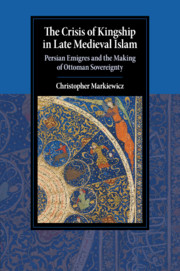Book contents
- The Crisis of Kingship in Late Medieval Islam
- Cambridge Studies in Islamic Civilization
- The Crisis of Kingship in Late Medieval Islam
- Copyright page
- Contents
- Figures
- Maps
- Acknowledgments
- Note on Usage
- Abbreviations
- Book part
- Introduction
- Part I
- Part II
- 4 The Timurid Vocabulary of Sovereignty
- 5 The Canons of Conventional Histories
- 6 Ottoman Sovereignty on the Cusp of Universal Empire
- Conclusion
- Book part
- Bibliography
- Index
- Series page
4 - The Timurid Vocabulary of Sovereignty
from Part II
Published online by Cambridge University Press: 03 August 2019
- The Crisis of Kingship in Late Medieval Islam
- Cambridge Studies in Islamic Civilization
- The Crisis of Kingship in Late Medieval Islam
- Copyright page
- Contents
- Figures
- Maps
- Acknowledgments
- Note on Usage
- Abbreviations
- Book part
- Introduction
- Part I
- Part II
- 4 The Timurid Vocabulary of Sovereignty
- 5 The Canons of Conventional Histories
- 6 Ottoman Sovereignty on the Cusp of Universal Empire
- Conclusion
- Book part
- Bibliography
- Index
- Series page
Summary
In a broad sense, Bidlisi’s political thought was conditioned by a particular tradition of sovereignty, which had its origins in the career of Timur, was developed through the competing claims of his descendants, and was adapted ultimately to courts throughout the central lands of Islam. In this way, the Timurid expression of sovereignty became a pronounced feature of kingship for all of the major polities of the sixteenth century. Yet the articulation and spread of this conception of sovereignty was not the product of some amorphous and abstract intellectual process. In many instances the adaptation of the Timurid conception of kingship can be traced through the movement of scholars and secretaries from one court to another and the adaptation of a new vocabulary of sovereignty to ever wider political contexts.
- Type
- Chapter
- Information
- The Crisis of Kingship in Late Medieval IslamPersian Emigres and the Making of Ottoman Sovereignty, pp. 151 - 191Publisher: Cambridge University PressPrint publication year: 2019

